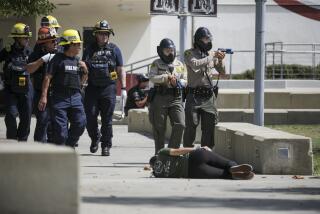California expands ban on ‘willful defiance’ suspensions in schools
California schools will no longer be able to suspend students in elementary and middle school for disrupting school activities or “willfully defying” the authority of teachers or administrators, ending a practice that many say is counterproductive and unfairly applied to black students.
Gov. Gavin Newsom signed legislation late Monday ending suspensions in all public and charter schools for “willful defiance” in grades 4 through 5 and banning them in grades 6 to 8 for five years. Such suspensions were already banned in grades K-3.
The broader ban comes in response, in part, to criticism that the willful defiance category of suspensions was a too-broad and arbitrary catchall for any behavior that a teacher finds objectionable, such as repeatedly tapping feet on the floor, refusing to remove a hat or failing to wear a school uniform.
“Ending willful defiance suspensions will keep kids in school where they belong and where teachers and counselors can help them thrive,” state Sen. Nancy Skinner (D-Berkeley), the bill’s author, said in a statement.
Under the legislation, school authorities could still remove disruptive kids from class, but would be encouraged to use alternative disciplinary practices, such as restorative justice or positive behavior support. Students could still be suspended for more serious actions, such as physical violence, theft or use of drugs.
The statewide action follows bans that have been put in place in at least five school districts throughout the state in recent years, first by the Los Angeles Unified School District in 2013 and later the Asuza, Oakland, Pasadena and San Francisco school districts.
Research has shown that suspensions and the accompanying loss of instructional time disproportionately affect students of color, particularly African Americans.
In 2017 and 2018, African American student suspensions represented 17% of total suspensions across the state, even though African American students made up less than 6% of total students in the state, according to California Department of Education data.
Research has also shown that suspensions do little to transform student behavior while increasing the likelihood that students will drop out of school or become involved in the criminal justice system.
“No student should be set back in their education for something as minor as chewing gum or talking in class,” said Angela McNair Turner, staff attorney at Public Counsel. “SB 419 is a huge step forward in addressing equity in schools across the state and eliminating the school-to-prison pipeline for youth in grades K-8.”
The original bill would have applied to grades 4 to 12 but was scaled back by the Assembly Education Committee. That committee also requested a sunset provision to the ban on suspensions in grades 6 to 8 to give school districts a chance to evaluate it.
The amended bill passed the Assembly and Senate with broad support and was backed by a wide coalition of youth and social justice groups, school districts and legal aid organizations.
The sole group to formally oppose the bill was the Charter Schools Development Center. Eric Premack, the group’s executive director, said it is “generally supportive” of policies to reduce unnecessary suspensions and expulsions but that the bill “imposes ‘one-size-fits all’ disciplinary standards that are not a fit for all schools in all circumstances.”
The new rules will go into effect on July 1.
Times staff writer Sonali Kohli contributed to this report.
More to Read
Sign up for Essential California
The most important California stories and recommendations in your inbox every morning.
You may occasionally receive promotional content from the Los Angeles Times.










